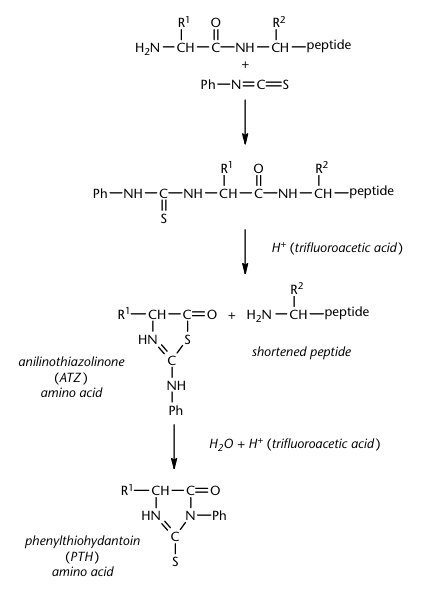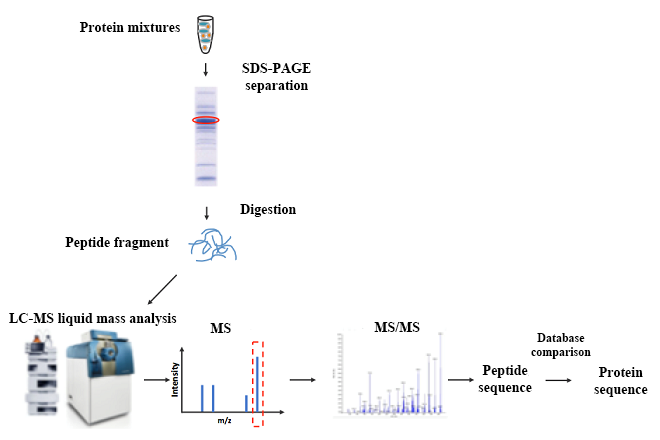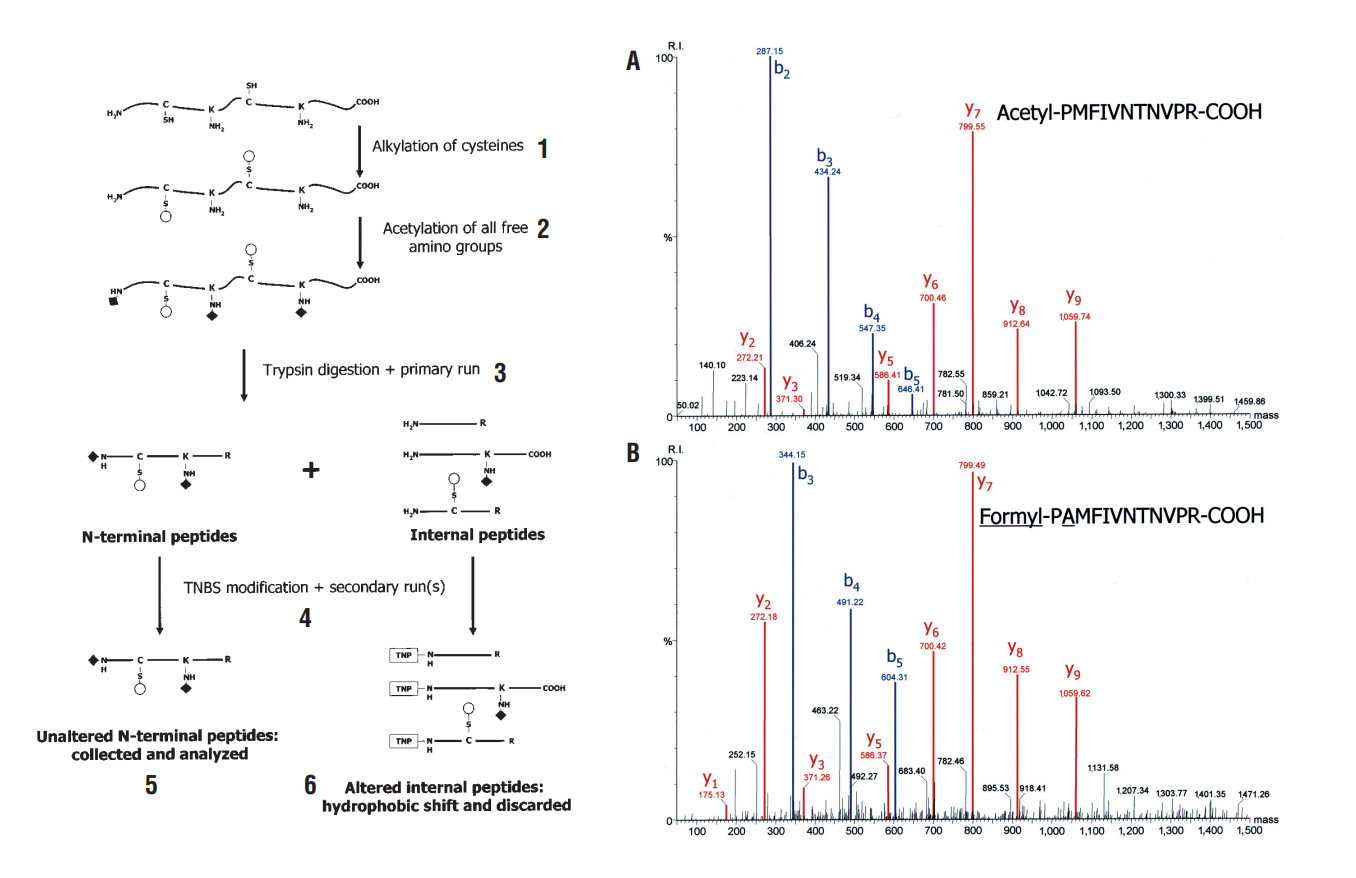Protein N-Terminal and C-Terminal Analysis Service
The N-terminal and C-terminal of a protein refer to the two ends of a protein molecule, representing the starting and ending points during protein synthesis. These termini play distinct roles in the biological functions of proteins, such as transport, localization, interactions, and enzymatic activity. The protein N-terminal and C-terminal analysis service enables scientists to better understand the structure, function, and behavior of proteins within cells.
Common techniques for analyzing the N-terminal of proteins include Edman degradation and mass spectrometry (MS), while the C-terminal is typically analyzed using carboxypeptidase digestion and MS. The principle of Edman degradation involves sequentially cleaving amino acids from the N-terminal of a protein using chemical methods, followed by identification of the amino acids through high-performance liquid chromatography (HPLC). For C-terminal analysis, the carboxypeptidase method relies on the enzyme’s ability to hydrolyze amino acids one at a time from the C-terminal of a peptide chain. By detecting the released amino acids, the sequence of the C-terminal can be deduced. However, due to differences in the enzyme’s affinity for various amino acids and the influence of multiple factors on the enzyme’s activity, this method has certain limitations.
Mass spectrometry is currently the most widely used, rapid, and accurate technique for analyzing the N- and C-terminal of proteins. It is based on the mass-to-charge ratio (m/z) and consists of two primary steps: mass spectrometry instrumentation and data analysis. The instrumentation converts protein molecules into ions and measures their m/z ratios, while the data analysis uses computational methods to interpret the ion spectra and deduce the amino acid sequences of the protein.

Smith, John. et al. Encyclopedia of Life Sciences, 2001.
Figure 1. Chemical Reaction of Edman Degradation Method.

Figure 2. Technical Process for Detecting Protein N-Terminal and C-Terminal by Mass Spectrometry.
Services at MtoZ Biolabs
Based on Shimadzu's new protein sequencer PPSQ-51A/53A gradient series, ultra-high performance liquid chromatography and high-resolution mass spectrometry (AB Sciex & Thermo) and other instruments, MtoZ Biolabs has established a comprehensive protein N-terminal and C-terminal analysis service platform. In the N-terminal and C-terminal amino acid sequence analysis of proteins, even in the case of trace samples, the amino acid sequence identification work can be completed. It can also perform protein, peptide, nucleic acid, small Conduct qualitative and quantitative analysis of molecular compounds, etc., and are widely used in biopharmaceuticals, food safety, environmental monitoring, forensics and other fields to provide guarantee for the detection of various samples.
Protein N-terminal and C-terminal analysis service provided by MtoZ Biolabs mainly include Edman degradation method to detect protein N-terminal and mass spectrometry to detect protein N-terminal and C-terminal, including:
1. Technical Advantages of Edman Degradation Method for Detecting Protein N-Terminal
(1) Specificity: High specificity for cleaving amino acids from the N-terminus without affecting other residues.
(2) Low sample requirement
(3) Automation
(4) High Sensitivity
(5) Compatibility with Complex Samples
(6) No Need for Complete Protein Hydrolysis
2. Technical Advantages of Detecting Protein N-Terminal and C-Terminal by Mass Spectrometry
(1) Mass spectrometry itself has the advantages of high sensitivity, high throughput, and high precision.
(2) The protein sequence can be reconstructed based on the peptide sequence generated by enzymatic hydrolysis
(3) It can be used in combination with other technologies. Chemical derivatization or isotope labeling can be used in conjunction with mass spectrometry to specifically detect the N-terminus and C-terminus of proteins.
Service Advantages
MtoZ Biolabs provides Edman degradation-based N-terminal detection and mass spectrometry-based N-terminal and C-terminal protein detection services. The key advantages of our services are as follows:
1. Transparent Pricing
Our pricing is clear and transparent, with no hidden fees or additional costs, offering excellent value for money.
2. Short Turnaround Time
MtoZ Biolabs has established protein N-terminal and C-terminal analysis service platform to ensure fast and accurate results, with a minimum completion time of just 5 days.
3. High Data Quality
By employing optimized experimental protocols, we deliver high-quality omics data. Our bioinformatics analysis ensures comprehensive data interpretation, accompanied by complete bilingual reports in English.
4. Customized Research Solutions
MtoZ Biolabs offers tailored services based on your sample requirements, supported by a professional pre-sales and post-sales team providing one-on-one support.
Sample Submission Suggestions
1. Sample Types
For Edman degradation, supported sample types include protein solutions, SDS-PAGE gels, and PVDF membranes. For mass spectrometry-based detection, supported sample types include protein powders or solutions, and SDS-PAGE gel bands.
Note: If you have any specific requirements or need assistance with sample preparation, please contact us.
Applications
1. Protein Identification and Sequence Determination
2. Molecular Weight Determination
Protein N-terminal and C-terminal analysis service can analyze proteins to help determine their complete molecular weight.
3. Protein Modification Studies
The N-terminal and C-terminal are common sites for many post-translational modifications, such as phosphorylation, glycosylation, and acetylation. Analyzing the N-terminal and C-terminal can help identify the modification states of proteins.
4. Protein Processing
Proteins may undergo processing after synthesis, such as the removal of N-terminal signal peptides or C-terminal amino acids. Terminal analysis can aid in studying these processing events.
5. Interactions
The N-terminal and C-terminal may be involved in protein-protein interactions or interactions with other molecules.
6. Protein Function Studies
(1) Enzyme Activity: Certain enzymes have active sites located on the N-terminal or C-terminal. Analyzing these terminals can aid in understanding enzymatic catalytic mechanisms.
(2) Localization and Transport: N-terminal signal sequences are crucial for the intracellular localization and transport of proteins.
7. Disease Research
(1) Disease Biomarkers: Some disease biomarkers may result from abnormal modifications or processing of protein N-terminal or C-terminal regions.
(2) Drug Targets: Specific sequences or structures of the N-terminal and C-terminal may serve as targets for drug design.
8. Protein Engineering
(1) Directed Evolution: Modifying the N-terminal and C-terminal can lead to the design of proteins with new functions.
(2) Protein Fusion: In protein engineering, different protein fragments can be fused to the N-terminal or C-terminal to produce fusion proteins with novel properties.
Case Study
1. Exploring the Proteome and Analyzing Protein Processing Through N-terminal Peptide Isolation and Mass Spectrometry Identification
This study introduces a novel approach using mass spectrometry to analyze N-terminal peptides, facilitating proteome exploration and protein processing research. The method leverages COFRADIC for N-terminal peptide isolation, significantly reducing proteome complexity and enabling detailed studies of N-terminal modifications and processing events.

Gevaert, Kris. et al. Nat Biotechnol, 2003.
Figure 3. Chemical and Chromatographic Steps for N-Terminal Peptide Sorting and Acetylation and Formylation of Macrophage Migration Inhibitory Factors.
Deliverables
1. Comprehensive Experimental Details
2. Materials, Instruments, and Methods
3. Data Analysis, Preprocessing, and Estimation (project-dependent)
4. Bioinformatics Analysis
5. Raw Data Files
MtoZ Biolabs, an integrated Chromatography and Mass Spectrometry (MS) Services Provider, provides advanced proteomics, metabolomics, and biopharmaceutical analysis services to researchers in biochemistry, biotechnology, and biopharmaceutical fields. Our ultimate aim is to provide more rapid, high-throughput, and cost-effective analysis, with exceptional data quality and minimal sample consumption. Free project evaluation, welcome to learn more details!
MtoZ Biolabs, an integrated chromatography and mass spectrometry (MS) services provider.
Related Services
How to order?







